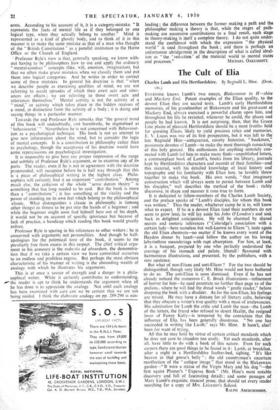The Cult of Elia
EVERYONE knows Lamb's two essays, Blakesmoor in H—shire and Mackery End. Potent examples of the Elian quality, to the devout Elian they are sacred texts. Lamb's early- Hertfordshire memories, of his grandmother at Blakesware and his great-aunt at Mackery End, always exercised a powerful charm upon him, and throughout his life he revisited, whenever he could, the places and people he had known. It is not surprising, then; that the Green Line plains of pleasant Hertfordshire should be a most fruitful field for questing Elians, likely to yield precious relics and memories. E. V. Lucas was one of its first prospectors, but it was left to the late Reginald Hine—antiquarian, county historian, " bookman," passionate devotee of Lamb—to make the most thorough ransacking of this holy ground. His enthusiasm for anything remotely con- nected with Lamb led him to make many finds—unpublished letters, a commonplace book of Lamb's, books from his library, journals kept by Hertfordshire characters and records of their families—and. this material, with his detailed knowledge of local history and topography and his familiarity with Elian lore, he lavishly threw together to make this book. His own words, " that imaginary conversation which will always seem to persist between Lamb and his disciples," well describes the method of the book ; richly discursive, in shape and manner it runs true to form.
It is dedicated to fellow-members of the Charles Lamb Society, and the preface speaks of " Lamb's disciples, for whom this book was written." Thus the reader, whichever camp he is in, will know what to expect. If he is a devout Elian (and theirnumbers do not seem to grow less), he will lay aside his John O'London's and sink back in delighted anticipation. He will be charmed by shared secrets and esoteric references ("Coleridge's association with a certain lady—here nameless but well-known to Elians "), taste again the old Elian chestnuts—no matter if he knows every word of the Haydon dinner by heart—and follow the author on his loving labyrinthine meanderings with rapt absorption. For him, at least, it is a banquet, prepared by one who perfectly understood the cravings of his stomach and palate, liberall., flavoured with harmonious illustrations, and presented, by the publishers, with a rare opulence.
But what of non-Elians and anti-Elians ? For the two should be distinguished, though very likely Mr. Hine would not have bothered to do so. The anti-Elian is soon dismissed. Even if he has not already noticed the numerous C. E. Brock illustrations—refinement of horror for him—he need penetrate no further than page xv of the prelims., where he will find the dread words " gentle reader," before dropping the book with a shudder. As for the non-Elian, his feelings are mixed. He may have a distaste for all literary cults, believing that they obscure a writer's true quality with a mass of irrelevancies. His admiration for Lamb the critic and Lamb the man—the Lamb of the letters, the friend who refused to desert Hazlitt, the resigned lover of Fanny Kelly---is tempered by the conviction that the influence of Elia has been generally disastrous. "No one has succeeded in writing like Lamb," says Mr. Hine. It hasn't, alas! been for want of trying.
All this he may hold by virtue of certain critical standards which
he does not care to abandon too easily. Yet such standards, after all, have little to do with a book of this nature. Even for such carpers there are good things to be found in it: Lamb, at breakfast, after a night in a Hertfordshire feather-bed, sighing, " It's like heaven in that goose's belly " ; the old countryman's uncertain recollection of the " antique image " that stood in the Blakesware garden—" It were a statue of the Virgin Mary and his dog "—the first squire Plumer's " Expense Book " (Mr. Hine's most notable discovery and full of fascinating detail) ; and some passages of Mary Lamb's exquisite, tranced prose, that should set every reader searching for a copy of Mrs. Leicester's School.
RALPH ABERCROMBIE.






































 Previous page
Previous page